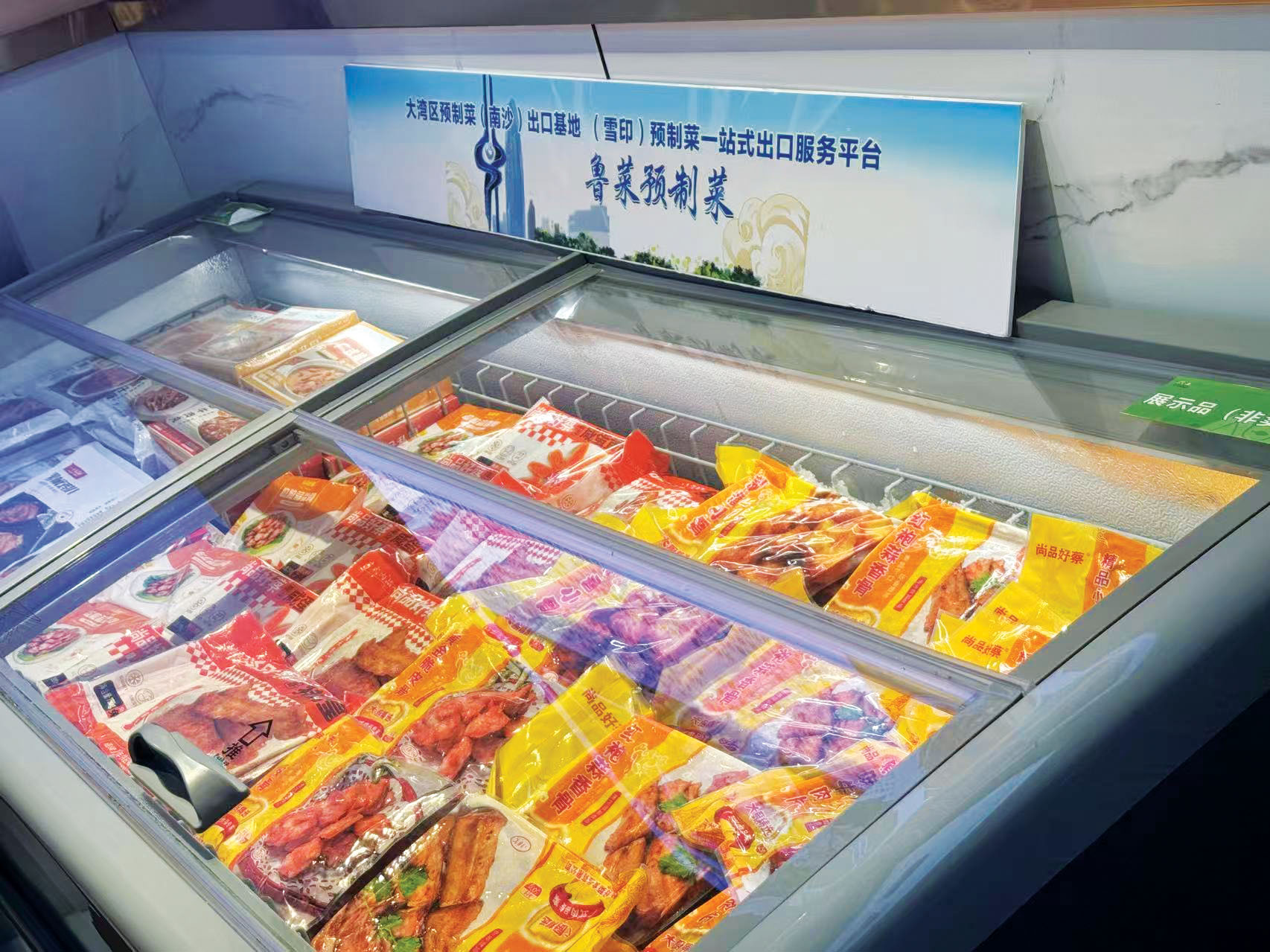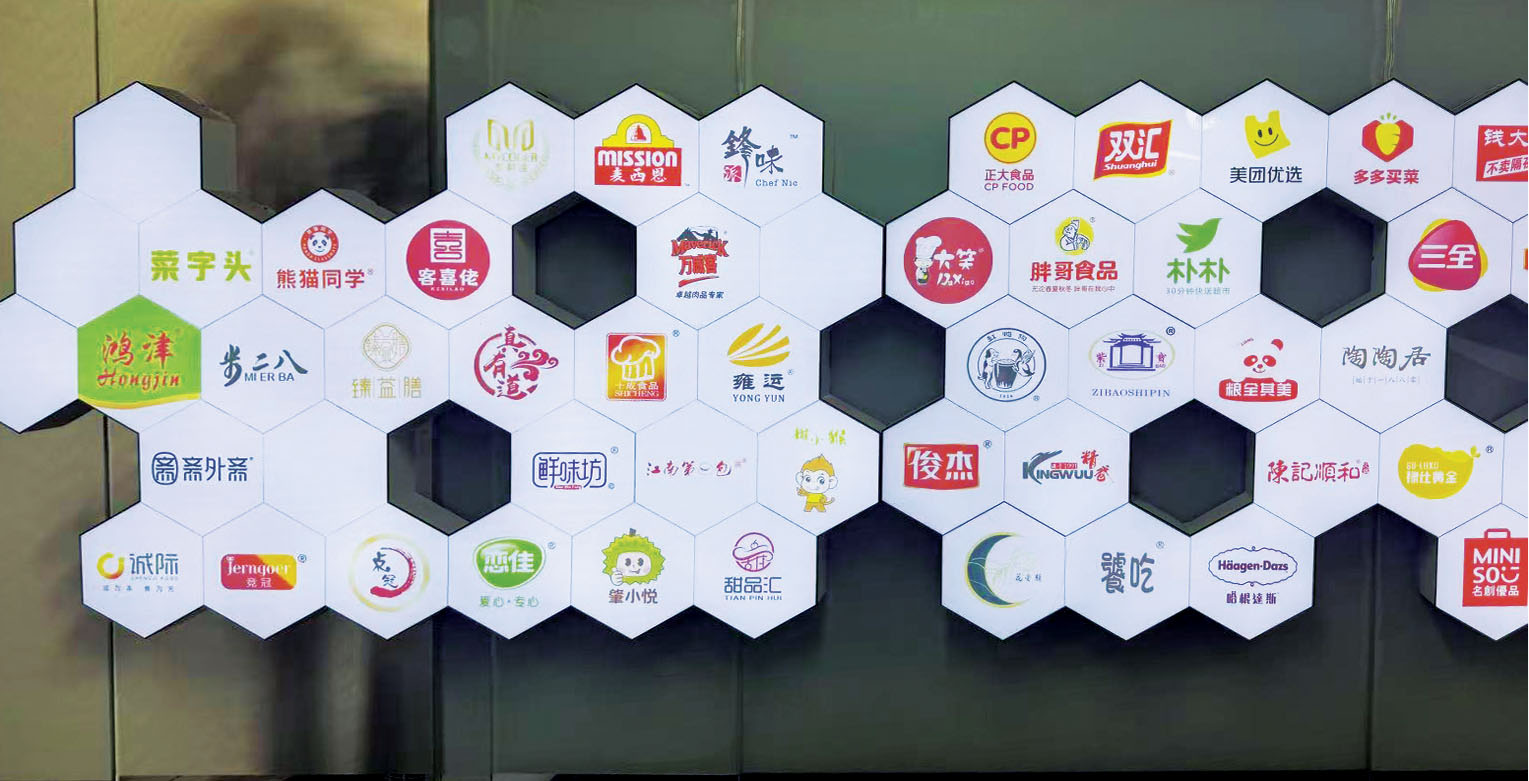Food oasis Guangzhou has added another jewel to its crown — as an exporter of exquisite Chinese precooked delicacies to the world. Its one-stop export service platform is set to grow, serving as a tribute to the city’s traditional culinary culture. Atlas Shao reports from Guangzhou.

Tangerine-flavored sliced chicken — a prized dish from Hunan province — and traditional Cantonese dim sum buns are among a slew of ready-made exquisite cuisines that can now be shipped in bulk from Guangzhou’s Nansha district to destinations around the world.
The delicacies, destined to reach tables around the world within 28 days after they’re prepared, are the new darlings of the gourmet market — made possible by the advent of innovation in transregional shipping.
The precooked dishes, produced by various food makers nationwide, are initially sent to the transit point — the Nansha Pre-cooked Food LCL Export Bonded Area Bonded Warehouse. The facility provides Less-than-Container Load (LCL) shipping, ensuring that orders, big or small, can be consolidated in one container, allowing clients to share the freight costs.
READ MORE: Food industry in Guangdong in fast lane
On arrival at the warehouse, the dishes are put in cold storage and placed in containers for clearance by Nansha Customs’ one-stop export model.
The inaugural LCL freight from the warehouse was sent to the United States on Sept 14.
Initially, five export shipping routes — to New York on the US East Coast, Los Angeles on the West Coast, Malaysia, Thailand and Hong Kong — have been added, according to Li Huang, principal person-in-charge of the Guangdong-Hong Kong-Macao Greater Bay Area Pre-cooked Food (Nansha) Export Base.
In April, another 10 ports went on the destination list, including the Port of Singapore, Jakarta Port in Indonesia, the Port of Rotterdam in the Netherlands and the Port of Hamburg in Germany.

Nansha has emerged as an aggregator for exports of precooked meals, leveraging its advantage as a key port in the country. The exports base is also the nation’s first “one-stop” export service platform for precooked food.
“Nansha’s biggest asset isn’t being a manufacturer of precooked food, but being an intermediary that streamlines exports by integrating resources,” says Li, who is also general manager of Guangzhou Xueyin Group — a representative company specializing in exporting ready-made meals.
The practice is akin to overseas consumers securing products from e-commerce platforms. They would assemble consolidated shipments, enabling shippers to share the cost of long-haul shipping which has proven to be a boon for ready-meal food makers.
Guangzhou Xueyin is also the operator of Nansha District Prepared Food Industrial Park.
Established in April 2022, the base has been collaborating with 88 buyers from 20 countries, and has set up an international precooked food procurement alliance.
At the inaugural Pre-cooked Food Export Forum held at the Guangdong-Hong Kong-Macao Greater Bay Area Pre-cooked Food (Nansha) Export Base, Guangzhou Xueyin won precooked food orders worth $1 billion with 12 other companies. The orders were mainly from Europe, the US and Southeast Asia, covering various categories of products like precooked aquatic, poultry and vegetarian dishes.
In 2023, Nansha produced more than 3-billion-yuan ($412-million) worth of precooked food in collaboration with nine enterprises, each generating revenues of over 100 million yuan — representing a year-on-year growth of 135 percent.
In late 2023, the Ministry of Agriculture and Rural Affairs recognized Nansha as a pilot zone for agricultural opening-up and cooperation.
Targeting overseas Chinese supermarkets and restaurants, Nansha’s precooked food industry has established xueyinfood.com — a trade platform linking 11 Guangdong industrial parks with more than 100 others nationwide, as well as 1,000 export factories.
Early last year, a New Zealand firm clinched a 30-million-yuan deal with Nansha to export New Year dishes to the Oceania nation.

Shared factories
Another Guangzhou-based company, Wulixing, made a breakthrough in this industry. It teamed up with Auckland-based White Diamond Foods to start a joint dumpling factory in New Zealand in mid-2024. Within four months, the factory had helped 22 dumpling chain stores achieve sales exceeding NZ$10 million ($5.96 million) and 30-percent net margins.
“The shared factory model has cut labor costs by 90 percent,” says Wulixing Chairman Mai Tao. By shipping equipment from China and utilizing space at a licensed factory in New Zealand, the approach bypasses the lengthy process of building traditional factories which, typically, would require more than six months to start production.
The dumpling venture has pioneered a collaborative model, with Chinese partners providing recipes, equipment and technology, while their New Zealand counterparts are responsible for local ingredients and production facilities. By manufacturing in-market, the approach cuts distribution costs, and dramatically shortens the journey from the factory to consumers.
According to Mai, Wulixing is evaluating the global market and may make further investments if more suitable factories and reliable partners can be found. It currently focuses on the domestic market due to the company’s relatively small overseas clientele which contributes between $10 million and $20 million to its business — less than 10 percent of total revenue.
Based in the Guangdong provincial capital’s Panyu district, Wulixing specializes in product development rather than production itself. Its own production accounts for just 10 percent of its operations, with 90 percent devoted to developing products and research.

Mai says research and development is critical in China’s crowded precooked food sector, with over 80,000 companies in the fray. A price war would sacrifice quality, he warns.
Founded in 2018, Wulixing initially distributed branded goods to connect consumers with quality factories before launching its own product line in 2022. It has since developed over 2,000 products, including 200 to 300 regular items.
Guangzhou has lived up to its accolade — a connoisseurs’ paradise. “We have the Cantonese saying, ‘Eat in Guangzhou’,” notes Mai, paying tribute to the city’s traditional culinary culture, talent base and logistics network.
ALSO READ: Premade food companies eye global expansion
He champions the innovative twists used in developing traditional dishes of precooked food, including Cantonese steamed items with black truffle or squid ink, char siu bao enhanced with matsutake mushrooms, and cheese-filled steamed buns.
As production spans multiple cities, 60 percent of Wulixng’s sales are in South China. “Regional dietary differences make familiar markets more advantageous,” Mai explains.
The safety of precooked dishes is well assured, with continued taste upgrades to rival freshly prepared food.
“We can expect to see a growth trend in precooked dishes in the future,” he says.
Contact the writer at atlasshao@chinadailyhk.com


